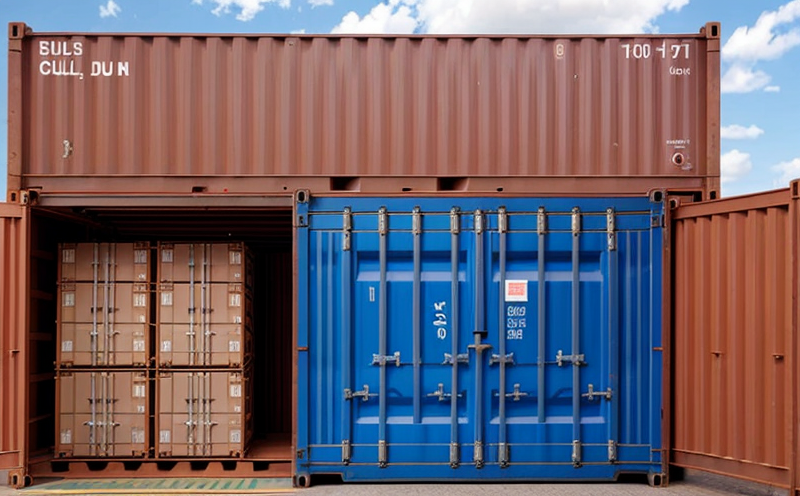USP Container Chemical Resistance Testing
The United States Pharmacopeia (USP) is a widely recognized and authoritative compendium of standards for medicine. One critical aspect of ensuring the integrity and safety of pharmaceuticals involves testing the chemical resistance of containers used in packaging and container closure systems. This service, USP Container Chemical Resistance Testing, ensures that the materials used in these packages do not interact adversely with the drug product or its excipients.
The process involves subjecting various container materials—such as glass vials, plastic bottles, and metal cans—to a series of chemical challenges designed to simulate real-world conditions. The goal is to determine whether the container can withstand the chemicals present in the pharmaceutical formulation without leaching harmful substances into the product. This testing is essential for compliance with USP monographs and guidelines.
The standard test procedure typically involves filling containers with specific chemical solutions, sealing them, incubating them under controlled conditions, and then analyzing the contents post-incubation. The testing covers a wide range of scenarios, including acidic, alkaline, neutral, and organic solvents that may be encountered during the pharmaceutical lifecycle.
The significance of this service extends beyond mere compliance; it plays a crucial role in protecting patient health by ensuring that packaging materials are safe for long-term storage and transport. Non-compliance can lead to contamination or degradation of the drug product, which could result in ineffective treatment or even harmful side effects.
Pharmaceutical companies must adhere strictly to USP guidelines to ensure their products meet stringent quality standards. This includes demonstrating that container materials are compatible with all components of the medicine, including active pharmaceutical ingredients (APIs), excipients, and packaging inserts. The testing process is not only about identifying compatibility but also ensuring that the materials do not degrade over time or under varying environmental conditions.
Compliance with USP guidelines is crucial for several reasons:
- To ensure patient safety by preventing contamination of drug products
- To maintain product integrity and efficacy during storage and distribution
- To comply with regulatory requirements set forth by agencies such as the FDA and EMA
- To protect brand reputation and consumer trust in pharmaceutical manufacturers
In summary, USP Container Chemical Resistance Testing is a vital component of ensuring that packaging materials are suitable for containing pharmaceutical products. By adhering to these standards, pharmaceutical companies can safeguard patient health while also meeting regulatory expectations.
Benefits
Conducting USP Container Chemical Resistance Testing offers numerous advantages for pharmaceutical manufacturers and packaging designers:
- Regulatory Compliance: Ensures adherence to USP monographs, thereby facilitating compliance with FDA, EMA, and other regulatory bodies.
- Patient Safety: Prevents the leaching of harmful substances into the drug product, safeguarding patient health.
- Product Integrity: Maintains the efficacy and quality of pharmaceutical products throughout their lifecycle.
- Brand Reputation: Enhances brand image by demonstrating a commitment to high-quality packaging solutions.
- Cost Efficiency: Identifies potential issues early in the development process, reducing the need for costly rework or recalls later on.
The testing also facilitates better understanding of how different materials interact with pharmaceutical products under various conditions. This knowledge can inform design decisions and optimize packaging solutions to meet both regulatory and practical needs.
Industry Applications
- Packaging Design: Assists in selecting the most appropriate materials for different types of pharmaceutical products, considering factors like acidity, alkalinity, and temperature stability.
- R&D: Supports research into new container designs and materials by providing data on compatibility with various formulations.
- Manufacturing: Ensures consistent quality in manufacturing processes by validating the effectiveness of packaging solutions across different stages of production.
- Distribution & Storage: Helps determine optimal storage conditions for packaged products, ensuring long-term stability and efficacy.
In addition to these applications, USP Container Chemical Resistance Testing is essential for addressing emerging trends in pharmaceutical packaging, such as biodegradable materials and advanced drug delivery systems. By staying ahead of regulatory changes and market demands, manufacturers can ensure that their products remain safe, effective, and compliant throughout the supply chain.
Why Choose This Test
- Comprehensive Evaluation: Tests a wide range of container materials against various chemical challenges to provide comprehensive insights into compatibility.
- Expertise & Equipment: Utilizes state-of-the-art equipment and experienced personnel to conduct rigorous testing that meets international standards.
- Custom Solutions: Tailors test protocols to meet the specific requirements of individual clients, ensuring accurate results for each unique product.
- Regulatory Approval: Provides reliable data that can be used to secure regulatory approval and certification.
The rigorous nature of this testing ensures that pharmaceutical packaging materials are robust enough to withstand the chemical challenges they may encounter during storage, transport, and use. By choosing USP Container Chemical Resistance Testing, manufacturers can ensure their products meet the highest standards of safety and efficacy.





